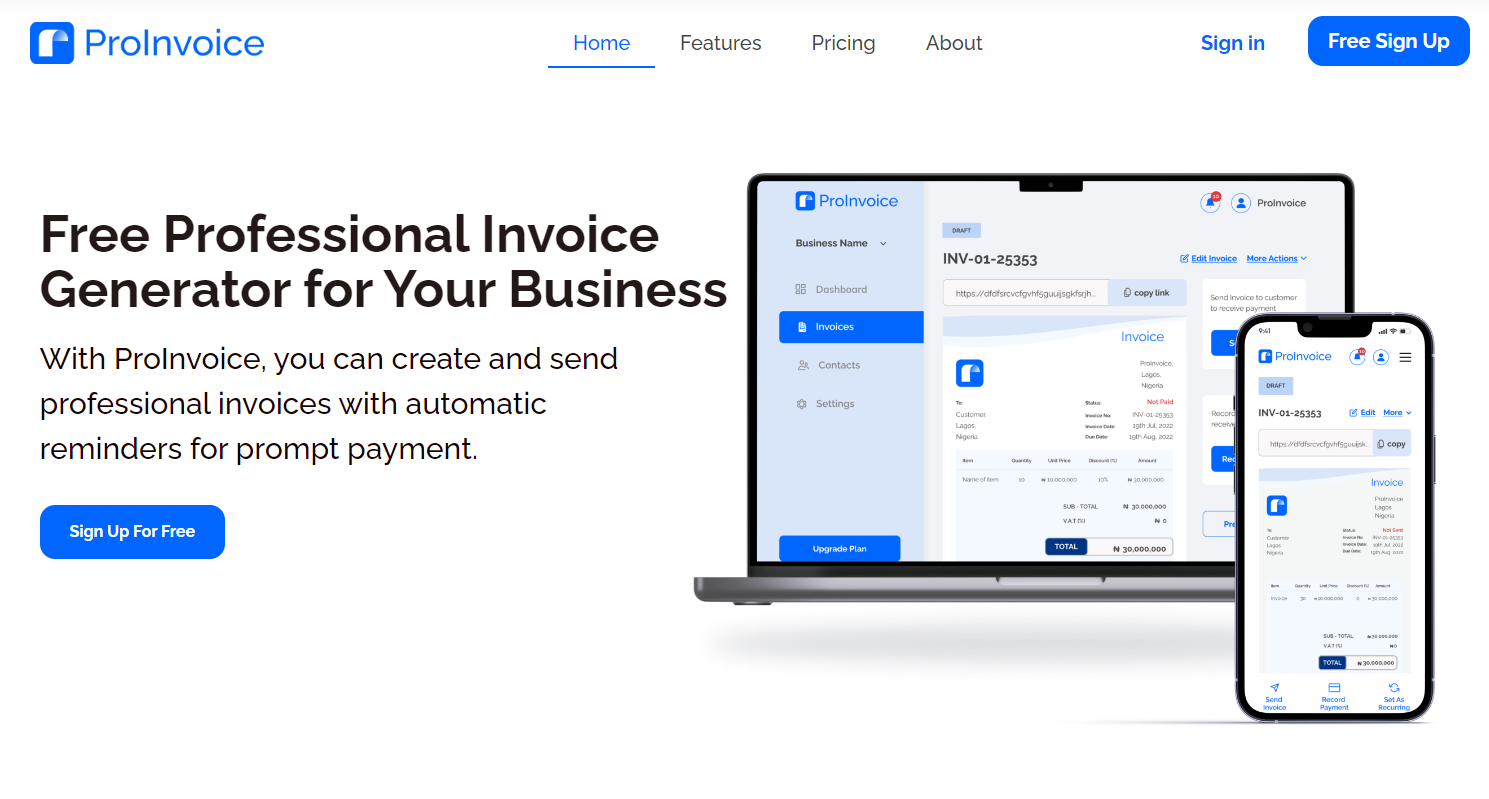Starting a business in Nigeria comes with big dreams and sometimes… small pockets. Many aspiring entrepreneurs have great ideas but often hit a wall when it comes to raising the needed capital.
The good news? There are practical and proven ways to finance a small business idea in Nigeria, even if you’re starting with zero naira. Whether you’re launching a fashion brand, a mobile food cart, or a digital agency, this guide walks you through smart funding options that Nigerian entrepreneurs can explore today.
👉🏽 Bonus Tip: Use ProInvoice to create free professional invoices, track payments, and keep your business finances organized — especially as you begin managing money from multiple sources.
Why Small Business Financing Is a Common Challenge in Nigeria
Many small businesses in Nigeria struggle to get off the ground due to:
- Limited access to bank loans
- Lack of collateral or guarantors
- High interest rates
- Limited awareness of funding opportunities
But with the right strategy and tools, you can still raise money for your business.
1. Start With Personal Savings
Using your own savings is the first and easiest way to finance your idea. It shows seriousness to potential investors and gives you freedom without debt.
Tips:
- Set a savings goal and cut down on unnecessary expenses.
- Open a dedicated business account for your saved funds.
- Use tools like ProInvoice’s free invoice templates to stay financially organized once you start earning.
2. Seek Support From Family and Friends
This is a common route for early-stage Nigerian businesses. If your inner circle believes in your idea, they may be willing to give or lend you money — with flexible terms.
Pro Tip:
- Present your idea like a pitch (include business goals, potential earnings, and how much you need).
- Keep proper records and repayment plans.
- Use ProInvoice to issue receipts or loan acknowledgments professionally.
3. Apply for Government Grants and Programs
The Nigerian government offers several SME funding opportunities through various agencies.
Examples:
- Tony Elumelu Foundation Grant – ₦5 million seed capital + training.
- BOI (Bank of Industry) loans – Structured funding for SMEs.
- NIRSAL Microfinance Bank – Offers AGSMEIS loans with low interest.
- YouWin! Connect – Government business funding for youth.
Tip:
Always check application windows and make sure your business has a clear plan and purpose.
4. Join Business Competitions and Pitch Events
These are great for both funding and visibility. Business pitch competitions often reward top winners with capital and mentorship.
Where to Look:
- Diamond Bank’s BET (Building Entrepreneurs Today)
- Lagos Innovates Idea Hub
- Access Bank’s Womenpreneur Pitch-a-ton
- Startup Nigeria and local incubators
Even if you don’t win, the exposure and feedback can help you refine your business model.
5. Leverage Crowdfunding Platforms
Crowdfunding is growing in Nigeria. You can pitch your business online and get people to donate small amounts.
Popular Platforms:
- NaijaFund
- Kickstarter
- Indiegogo
- GoFundMe (for social enterprises)
Make sure your campaign has a clear message, visuals, and breakdown of how the funds will be used.
6. Explore Cooperative Societies
Local co-ops or esusu savings groups offer financial support without the bureaucracy of banks. Many Nigerian entrepreneurs start with this model to raise small capital or emergency funds.
- Join a business-oriented cooperative.
- Take soft loans and repay gradually.
- It’s more flexible and comes with community support.
7. Use Microfinance Banks & Digital Lending Apps
For quick access to small business capital (₦10k – ₦500k), microfinance banks and digital loan apps can help. While interest rates may vary, many do not require collateral.
Trusted Options:
- LAPO Microfinance Bank
- FairMoney
- Carbon
- Branch
- Kuda Overdraft
💡 Track all incoming and outgoing payments from lenders and customers with ProInvoice’s simple dashboard.
8. Partner With Someone
If you can’t afford to go solo, find a partner who brings in capital while you contribute the skills or operations.
What to Do:
- Set clear terms of partnership.
- Use a lawyer to draft an agreement.
- Split profits transparently.
And of course, keep accurate records using free invoicing tools like ProInvoice so your finances remain transparent to both parties.
9. Attract Angel Investors or Startup Investors in Nigeria
If your business idea has potential to scale quickly, angel investors or venture capitalists may want in.
Where to Find Them:
- Rising Tide Africa
- GreenHouse Capital
- Microtraction
- Future Africa
- Lagos Angel Network
You’ll need a solid business plan, traction (even if small), and professionalism in your documentation.
🧾 Impress investors with clear financials using ProInvoice’s free invoice creator for your customer transactions.
10. Reinvest Profits and Bootstrap
This is the “slow and steady” method, but it works. As soon as your business starts generating revenue, reinvest your profits rather than spending them.
Over time, this builds sustainability and reduces reliance on external funding.
Bonus: How ProInvoice Can Help You Build Credibility & Manage Business Funds
Whether you’re raising funds or receiving your first customer payment, how you manage money matters.
With ProInvoice, you can:
- Create clean and professional invoices
- Track who owes you and when
- Send automated payment reminders
- Download PDF invoices for proposals or investor presentations
- Show professionalism to clients and investors
✨ Sign up now for FREE on ProInvoice and take control of your business finances — no card required.
Conclusion
Starting a business in Nigeria is a bold move — but it doesn’t have to be financially impossible. Whether it’s through savings, grants, loans, or partners, there are many ways to fund your idea.
The key is to start small, stay organized, and present your business with credibility. Tools like ProInvoice can help you look the part and keep things structured.













